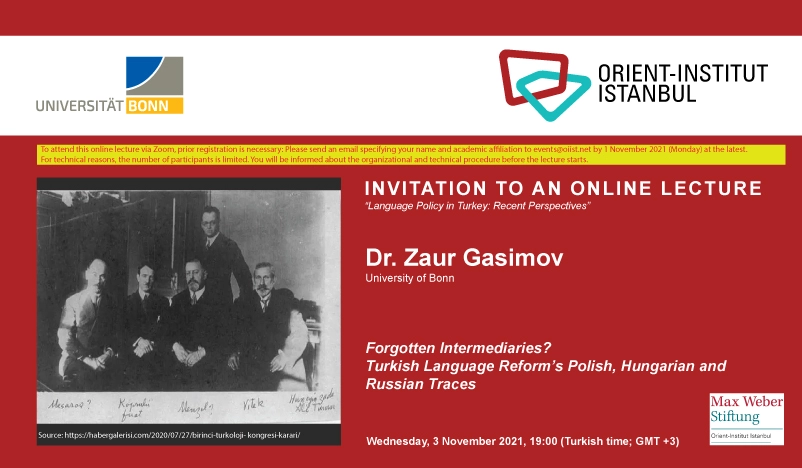
- Diese Veranstaltung hat bereits stattgefunden.
Language Policy in Turkey: Recent Perspectives – Dr. Zaur Gasimov
November 3, 2021@7:00 pm–9:00 pm

Abstract:
The Turkish Language Reform is one of the most fascinating cultural projects of the first half of the 20th century. Throughout the 1920s, numerous distinguished linguists from Hungary, Soviet Russia and Poland visited the University of Istanbul and maintained close contacts with Turkish academia. Mészaros Gyula, Wilhelm Barthold and Süreyya Szapszal were important inspirers, commentators and co-shapers of the Turkish linguistic purism of the 1920s. Neglected by international scholarship, Hungarian, Polish and Russian specialists along with the Turkic exiled linguists based in Istanbul and Ankara heavily contributed to the Language Reform in Turkey by knowledge and experience transfer. The paper tries to shed light on the East European impact on the Language Reform in Turkey in the 1920–30s.
About the speaker:
Dr. Zaur Gasimov studied international relations, international law and history in Baku and Berlin. In 2009, he graduated from the PhD program at the Catholic University Eichstätt-Ingolstadt and joined the Leibniz-Institute of European History in Mainz, Germany. From 2013 to 2019, Gasimov was a Senior Research Fellow at the Orient-Institut in Istanbul, Turkey. In 2020, Gasimov joined the Russian Studies Department of the University of Bonn, Germany, as a DFG Principal Investigator. He has published extensively on Russian-Turkish relations and entangled history of Eastern Europe and the Middle East (last monograph: Historical Dictionary of Azerbaijan, New Edition, Rowman & Littlefield 2018).